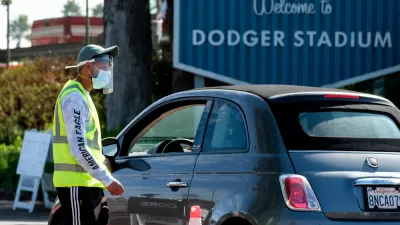If two assembly members from San Francisco and Marin counties have their way, pedestrians and bikers on the Golden Gate Bridge will not be tolled as if they were in a motor vehicle.
"Such a law would undoubtedly calm the uproar from bicyclists and pedestrians following an Oct. 24 vote by the (Golden Gate Bridge, Highway and Transportation) District’s board to study whether it would make sense to charge a toll to those who use the bridge’s sidewalks," writes Michael Cabanatuan of the San Francisco Chronicle.
Assembly member Phil Ting (D-S.F.), author of a bill signed by Gov. Jerry Brown in September that allows for the building of protected bike lanes in the Golden State by including them in the California Highway Design Manual, "said the bridge district should cross the tolls off its (45-point plan to eliminate a projected $32.9 million budget shortfall over the next five fiscal years,)" writes Cabanatuan.
At a time when the state is working to get more people to walk and bike, he said, it makes no sense to charge people to do the environmentally correct thing.
Assembly Member Levine (D-San Rafael), citing the Golden Gate Bridge’s world renown, said charging a sidewalk toll would send the wrong message about the Bay Area’s commitment to combatting climate change.
Neither legislator, nor those from other groups cited in the article, endorsed any of the other options in the district's 45-point plan, such as raising tolls for motor vehicles or raising fares on Golden Gate Transit or Golden Gate Ferry Service. The purpose of the bill, to be proposed Monday, is only to eliminate the option of a biking and walking toll.
No comment from the bridge district other than to state that "the decision to study sidewalk tolls was made by the 19-member board of directors." Ting's press release indicates that "(l)eading up to the District’s vote to study a sidewalk fee, it received 4,205 letters in opposition and 16 in support - a 262:1 ratio against the fee."
It would not be the first time that state legislation (or even the threat of proposing legislation) would be used to remove a legitimate option from an independent local or regional planning or governmental entity. The San Francisco County Transportation Authority eliminated one of its tolling options in a congestion pricing study due to a legislative threat from a Peninsula assembly member.
"Assemblyman Jerry Hill, D-San Mateo [now state senator], the only state legislator whose district is entirely within San Mateo County, said he'd be 'happy' to carry such a bill to retaliate against a 'ridiculous' idea," wrote Mike Rosenberg of the Bay Area News Group on Dec. 12, 2010, referring to writing legislation to implement a southbound toll in response to the San Francisco County Transportation Authority's inclusion of an option to toll the southern border with San Mateo. SFCTA removed the option.
The analogy is lacking in the sense that unlike the SFCTA's tolling study, the bridge district will not need to get legislative authority to implement the sidewalk toll. In fact, the toll would not even be new as it existed from from May 1937 to December 1970, as noted earlier.
The district's board of directors, while not directly elected by constituents of the six counties they represent, are composed of elected and non-elected members appointed by the boards of supervisors and other elected government entities in San Francisco, Marin, Sonoma, Napa, Mendocino and Del Norte counties.
FULL STORY: Legislators want to outlaw pedestrian tolls on Golden Gate Bridge

Planetizen Federal Action Tracker
A weekly monitor of how Trump’s orders and actions are impacting planners and planning in America.

Maui's Vacation Rental Debate Turns Ugly
Verbal attacks, misinformation campaigns and fistfights plague a high-stakes debate to convert thousands of vacation rentals into long-term housing.

San Francisco Suspends Traffic Calming Amidst Record Deaths
Citing “a challenging fiscal landscape,” the city will cease the program on the heels of 42 traffic deaths, including 24 pedestrians.

Amtrak Rolls Out New Orleans to Alabama “Mardi Gras” Train
The new service will operate morning and evening departures between Mobile and New Orleans.

The Subversive Car-Free Guide to Trump's Great American Road Trip
Car-free ways to access Chicagoland’s best tourist attractions.

San Antonio and Austin are Fusing Into one Massive Megaregion
The region spanning the two central Texas cities is growing fast, posing challenges for local infrastructure and water supplies.
Urban Design for Planners 1: Software Tools
This six-course series explores essential urban design concepts using open source software and equips planners with the tools they need to participate fully in the urban design process.
Planning for Universal Design
Learn the tools for implementing Universal Design in planning regulations.
Heyer Gruel & Associates PA
JM Goldson LLC
Custer County Colorado
City of Camden Redevelopment Agency
City of Astoria
Transportation Research & Education Center (TREC) at Portland State University
Jefferson Parish Government
Camden Redevelopment Agency
City of Claremont




























